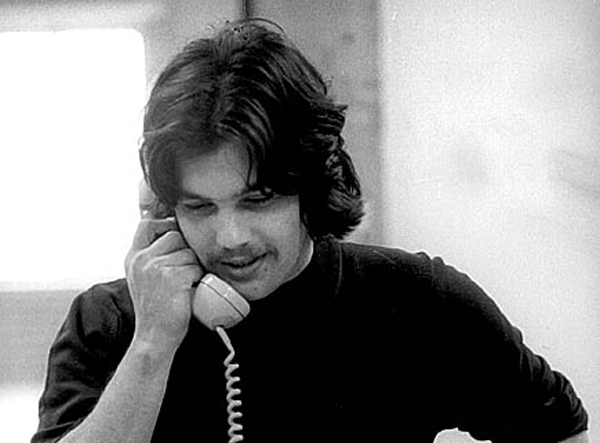-
Easily Assimilated: Jann Wenner, David Geffen, and the Capitalism of the Closet
by Sam Biederman March 19, 2010

It’s a business cliché that change is the only constant. So much so that, in certain offices in which I’ve worked, the word “change” has been banned from internal communications. But it’s repeated because it’s true: capitalism thrives on what’s new, operating on the assumption that there’s always something better, or at least more salable, around the corner.
Jann Wenner and David Geffen, two of the most illustrious Baby Boomer businessmen, exemplify this thinking. Wenner, who founded Rolling Stone and Geffen, who remains one of the world’s most powerful record producers, epitomize Baby Boomer success. Launching their businesses and their personal brands out of the music-driven counterculture of the sixties, they monetized their own hipness through publishing and recording. As their business profiles grew, so did their personal visibility. The bearded bad boy son of a wealthy San Francisco family, Jann was sexy, powerful, and fun: he was never without a bump to share with his writers. David was the brash Jewish upstart, a Brooklynite with an ear for what was next, and always had a model on his arm. In a phrase, they were big personalities. Their egos fueled their success and vice versa. That they were both college drop-outs is no accident—it speaks to how iconoclasm doesn’t hurt when you’re trying to launch an empire.
And both were selling the same Aquarian vision of a loose lifestyle, in which all personalities were changeable and all traits were ethereal. On a Geffen record, Joni Mitchell sang about being a Free Man in Paris (a song, incidentally, inspired by Geffen himself), while Wenner named his very publication after that which grows no moss.
Aside from their product and their egos, Wenner and Geffen have yet another quality in common: they are both gay. For much of their careers, they were both in the closet. Finally, protected from prejudice by wealth and distanced by time from initial shock of AIDS, Wenner and Geffen both very publicly declared their sexuality in the early nineties. Wenner’s coming out earned a feature in the Wall Street Journal (which shows just how far he had come from the hairy, skunky sixties) and Geffen announced his gayness at a keynote address at a benefit in LA (ditto). The news came as a shock to some, but not to all. Wenner had what seemed to be a marriage of convenience with his longtime wife, who owned half of Wenner Media, Geffen had conducted a string of relationships with recording stars in the seventies, including Cher—whom, as beards go, gets something close to a D-minus.
So, twenty years on, is there a significance to the shared sexuality of these captains of media, or is it just biography? I don’t know if gayness can ever just be background. In our overheated culture, sexual preference is central to personality—particularly when it’s so closely guarded. Successful people who choose to remain in the closet are necessarily excellent adapters. The closet is a hothouse specially designed to chameleons. It creates extreme extroversion, which allowed both men to be so flexible, and so eager to be a part of what was happening next. Wenner and Geffen had a choice between being in with the in crowd or being out of the closet.

Just as assumed personalities to fit the demands of wives, lovers, and publicists, so did they assimilate their business models to the demands of the market. Throughout their closeted decades of seventies and eighties, Wenner and Geffen were able to grow their empires thanks in large part to their ability to embrace the constant change that define both Boomers and business. Geffen switched from acoustic, folksy rock to Disco to Peter Gabriel. In the early eighties, when San Francisco’s cultural scene was floundering, Wenner packed up shop and moved the operation to New York, to be a part of the city that was on the verge of a renaissance.
But as similar as the two icons were in their heyday, when they came out their paths diverged. Right after Wenner came out, he missed a big gamble on the Internet, having been offered insider deals on Netscape and other Silicon Valley start-ups that still remembered his contribution to the Bay Area. He turned them all down. It’s arguable that he moved his operation out of San Francisco at the worst possible moment, just before the city became flush with investment for the new economy. And his slow slide has continued. Rolling Stone itself was late to the Internet, and has been overtaken by Pitchfork and other online titles as the first voice in music journalism. Finally, in recent years, Rolling Stone had to scale back its iconic outsized printing style. If that’s not indicative of a loss of influence, I don’t know what is. Wenner, then, finds himself strangely stalled. He’s stuck with the last big identity he embraced
Geffen, however, burst out of the closet but never forgot the lessons. Bracing himself against the collapse of the music business, he wisely widened his scope to entertainment, hitching his wagon to Dreamworks’ star, and producing some of the most popular and profitable movies of the last decade. He even proved himself to be politically nimble, famously abandoning the Clintons in the most recent presidential primaries for the Next Big Thing, Barack Obama.
Did the closet actually create the twentieth century’s most visionary businessmen? Not entirely—but it couldn’t have hurt. Wenner and Geffen were perfectly primed by the closet to connect with the identity-anxiety capitalism fosters in the modern consumer. The closet discourages its prisoners from alighting on a finite personality—that would mean “giving in” to homosexuality. Consumer capitalism likewise thrives on feelings of deep inadequacy and constant transformation: buying a new brand of toothpaste, different shoes, the latest model Mustang will create a new you. Both the closeted homosexual and the consumer then reject self-definition in favor of a kind of anti-personality, a personhood that is built around willful denial of self-knowledge.
Wenner and Geffen were able to unite these two similar anxieties and profit greatly. But not everyone is so smart, or so mercenary. Indeed, most of us are simply subjects of consumer culture, rather than influencers. The system pushes each of us to constantly transform in the most superficial ways, via new and different patterns of consumption, just like the gay man constantly shifting his position to convincingly play straight. Consumer society reminds us that our personalities are never “right,” that we’re always lacking some essential element, making closet dwellers of us all.

